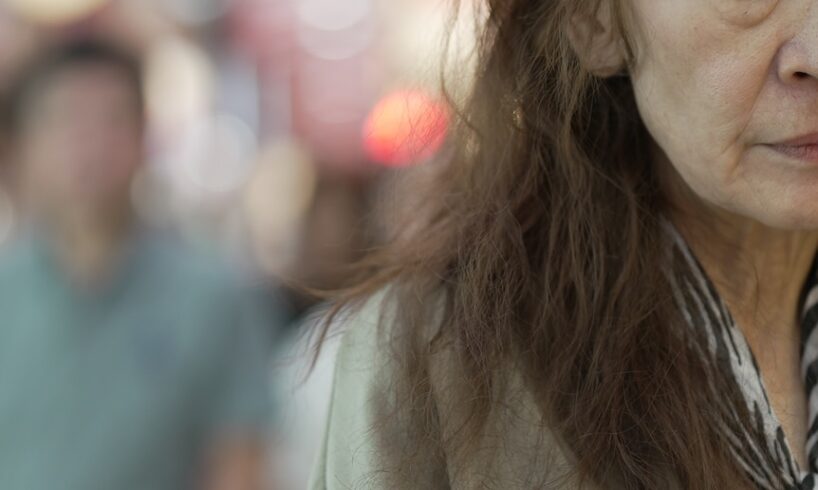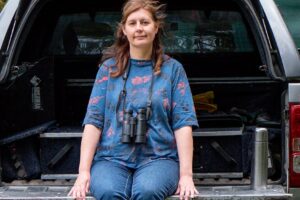
Chika Honda stood in stunned silence as the heroin was pulled out of her travel bag at Melbourne’s Tullamarine Airport.
It was June 1992 and the young Japanese woman thought she was about to start her dream holiday in Australia.
Instead, Chika, along with three other tourists, was accused of smuggling 8.5 kilograms of pure heroin into the country.
The drugs were found tucked away behind false panels across four suitcases in what was the largest haul of its time.
Despite her pleas of innocence, Chika and her companions were charged with importing heroin and sentenced to a maximum of 15 years in an Australian jail.
The ringleader of the operation received 25 years.
“I just wanted to wake up from this dream,” she says.
“No matter how hard I hit myself or pinch myself, I couldn’t wake up.
“I got terribly depressed. I attempted suicide three times. I just wanted to die.”
If you or anyone you know needs help:
Lifeline on 131 114Kids Helpline on 1800 551 800Beyond Blue on 1300 224 63613 YARN on 13 92 76Suicide Call Back Service on 1300 659 467MensLine Australia on 1300 789 978Headspace on 1800 650 890ReachOutSANE on 1800 187 263Call triple-0 if you need immediate care
Over the years, Chika has consistently maintained her innocence, claiming her bags were stolen and replaced by one of the men she was travelling with.
The Victorian judicial system dismissed this story as a well-rehearsed, fanciful concoction.
But in the years after Chika was imprisoned, a growing number of people questioned whether she should have been jailed, especially in Japan, where the incident is widely considered a gross miscarriage of justice.
It is known as “The Melbourne Case”.
All attempts to clear Chika’s name have failed, including appeals to the United Nations Human Rights Commission.
But the convicted drug smuggler has renewed purpose.
She has seen her story reflected in the case of Perth grandmother Donna Nelson, who was sentenced to six years for smuggling 2 kilograms of methamphetamine, found in a false bottom of her suitcase.
The love scammer who ruined Donna’s life
Donna claims to be the innocent victim of a love scam, tricked into carrying the case by someone she courted online for two years.
But on September 25, she lost her appeal to the Japan High Court against her conviction.
Chika says she is telling her story to help Donna.
“For her sake,” she says.
“For the innocent to be saved.”
A group trip to Australia
Chika had long dreamed about going to Australia.
Back in the 1990s, it was a top destination for Japanese travellers.
So, when one of her close friends offered her a ticket for a group tour to Australia, she jumped at the chance.
Chika Honda was offered the chance to come to Australia by a friend. (Supplied)
“Australia was the big craze back then,” she recalls.
“Kangaroos and koalas. I wanted to see the koalas.”
Chika did not know most of the people she was set to travel with. Her friend’s boyfriend, Mitsuo, was going, and his brother, Yoshio Katsuno, was organising the trip.
Yoshio had told friends he received the tickets to Australia as compensation for a small car crash he was involved in during a business trip.
Chika had never been overseas before, so put her trust in the trip’s organisers.
But Yoshio had low-level connections with the Yakuza and it was not long before the dream holiday went sour.
The missing luggage that changed everything
After arriving in Malaysia, the group met up with “Charlie”, a business contact of Yoshio’s.
The tourists went to a restaurant for lunch, while their belongings were stored in a van outside.
Chika Honda looks at an image of her younger self on her phone. (ABC News: James Oaten)
But while eating, the group were told the van had been stolen.
Chika was distraught and told to wait at the hotel as Yoshio and Charlie vowed to track down the stolen van and belongings.
Later in the day, the tour group received good news. The stolen luggage had been recovered, but the bags were so severely damaged that their clothing had to be put in new bags, according to court documents.
Chika recalls thinking the replacement bag was big and ugly, but her attempt to find an alternative “cute” bag failed.
So, she decided to accept the situation and buy a new bag in Australia.
A dream holiday turns into a nightmare
As their flight touched down in Melbourne, the troubles in Malaysia were quickly forgotten.
The group made their way through Tullamarine Airport without incident, until they were suddenly stopped.
It turned out the “tour leader”, Yoshio, had had his visa cancelled while en route as Australian authorities had cottoned on to his criminal connections.
Yoshio held the tickets of his fellow travellers, so the entire group was pulled aside, and their bags searched.
The suitcases contained 8.5 kilograms of pure heroin. (Supplied)
Security cameras captured the moment.
“If the Japanese tourists with four new suitcases knew what was hidden in them, they showed little sign of it,” a media report from The Age said.
“All six look equally perplexed and annoyed at the delay — but not yet nervous, despite the fact that their tour leader, Yoshio, was obviously being questioned.”
When the baggage was inspected, officers found 13 kilograms of white powder, containing 8.5 kilograms of pure heroin, hidden inside false suitcase bottoms.
Two of the travellers did not have suitcases, so were released and returned to Japan.
But Chika was not so lucky.
She was arrested and spent hours explaining herself to law enforcement, without a lawyer present.
Footage of Chika Honda’s interview with officers after drugs were found in her bag in Australia. (YouTube: mayukanamori)
She is adamant she just wanted to help, thinking she could go home afterwards.
But right from the start there were problems with the interpreter, with regular translation errors and misunderstandings.
“Even though I kept saying it was not [my bag], he interpreted that it was mine,” she recalls.
“I said, ‘No, it’s not!’ and that ‘This suitcase was stolen from a restaurant while I was travelling to Australia, and this heavy suitcase is definitely not mine.’
“The interpreter said he didn’t understand what I was saying. Apparently, he was some kind of Japanese language teacher at a school.”
The courts would later conclude the lost luggage story was a “cover”, saying it was so “improbable” for bags to be found so soon after their theft, with no items missing.
It also concluded the bags were so heavy it was inconceivable that the travellers were unaware their luggage contained narcotics.
But Chika maintains she had no idea what was inside her bags.
“It never crossed my mind,” she says.
“I’d never seen anything like that on TV.
“And it was a huge, heavy suitcase. I thought maybe it was heavy because it was an old style.”
When all hope of legal challenge is lost
Chika was tried alongside Yoshio and four other tourists.
The two other travellers without suitcases were never called back as witnesses. The prosecution labelled them “unreliable”.
Chika says she was not given the opportunity to give evidence to the court, something she now deeply regrets.
Chika Honda was charged with importing heroin and sentenced to 15 years in an Australian jail. (YouTube: mayukanamori)
An appeal court later found this lack of evidence only strengthened the initial finding against her.
“My name barely got heard in court, so I thought I’d won,” she remembers.
“But then it was ‘guilty’. And when I was found guilty, my lawyer’s head just dropped. And my mind went completely blank.”
Chika and her lawyers tried to appeal but all legal avenues failed.
Later, Japanese lawyer Kiyoshi Yamashita joined Chika’s defence and filed a petition for her to be pardoned. It was unsuccessful.
To this day, he feels compelled to raise awareness about Chika’s plight, and recently wrote a book about her case.
“This is an absolutely appalling incident, no question about it,” he told the ABC.
“There was no defence lawyer willing to fight thoroughly.”
As part of his efforts to pardon Chika, Kiyoshi travelled to Malaysia to speak with Charlie.
He was serving time for another drug-related matter and Kiyoshi says during this interaction, Charlie admitted he did not believe Chika knew about the drugs.
The information formed part of his unsuccessful pardon petition.
“It is a difficult situation to handle, but the Australian defence team had never been to Kuala Lumpur, nor had any legal personnel been there, and naturally, the police hadn’t been either,” he says.
“To be perfectly frank, Chika was incredibly naive.”
Chika Honda is adamant she just wanted to help when she spoke with officers after her bags were searched. (ABC News: James Oaten)
Ultimately, Chika argues she never stood a chance.
Headlines about the ringleader’s yakuza connections tainted the whole group, it has been argued.
“Asian equals drugs,” she says.
“Because Chinese and Thai people are all involved in drug smuggling, aren’t they? Japanese are the same, being Asians. They decided we were drug smugglers from the start.”
Should drug mules face heavy jail sentences?
In Australia and Japan, a court does not need to prove the accused deliberately trafficked drugs or was actively part of the criminal syndicate.
Rather, a guilty verdict can be reached if the accused is proven to be negligent.
In other words, turning a blind eye to the fact they are carrying drugs.
“A person is not entitled to deliberately shut his or her eyes to the truth,” the judge instructed the jury in Chika’s case.
Chika Honda’s memories of her time in Melbourne are still raw and traumatic. (ABC News: James Oaten)
Despite pleas of ignorance or innocence, often the intent of the accused will never be fully known. It is the court’s job to accept a version of events put forward by a legal team.
In the end, the court determined Chika was actively part of the smuggling operation.
“I am satisfied that Yoshio ‘schooled’ the four Japanese couriers,” he said.
“I find that the story of the luggage being stolen and its subsequent replacement was a concoction.
“I therefore conclude that the four Japanese couriers knew that they were carrying narcotics.”
But every year, there are new cases of vulnerable travellers supposedly duped into carrying drugs across borders.
The people at the centre of them are often sentenced to lengthy jail terms, even death.
In Donna’s case, the judge accepted she was tricked but found the story about her online boyfriend, Kelly, and the request to bring a bag from Laos to Japan as too “suspicious”.
Donna Nelson lost her appeal in Japan’s High Court this week against her conviction for drug smuggling. (Supplied: Yoshitaka Enomoto)
Donna’s lawyers have argued she searched the bag she was given, and apart from finding a few clothing samples, did not find anything suspicious.
But the judge said she still should have suspected something was off and refused to take the baggage.
“The doubt something illegal could be inside the suitcase was not resolved,” Judge Masakazu Kamakura said.
A cornerstone of the judicial system in both Australia and Japan is deterrence. If someone is sent to jail for committing a crime, it serves as a warning for others.
But some experts say that does not work for people who have been genuinely tricked, and argue people like Donna and Chika should not be jailed.
“The purpose of imprisonment is to punish, deter other people and rehabilitate,” criminologist associate professor Natalie Gately from Edith Cowan University says.
“Now, you look at those cases, you’re not going to rehabilitate them because they didn’t know they were doing anything wrong. They didn’t knowingly break the law.
“They don’t have a drug problem themselves, so you’re not going to rehabilitate them.
“We’re punishing them for something that they didn’t knowingly do.”
‘An overwhelming sense of helplessness’
The alleged scam that ensnared Chika may seem crude by today’s standards, but international travel was less common in the 1990s, and so awareness was much lower too.
It was only after that case that airport signage warning about drugs hidden in bags became prevalent in Japan.
“It’s not something that was very much in people’s consciousness because we didn’t hear a lot about it,” Natalie says.
Chika Honda was deported back to Japan from Australia in 2002. (ABC News: James Oaten)
But as awareness has increased, thanks to high-profile cases, the scams have also adapted.
“Now they’re going online, and they’re having intense long relationships and building that trust before they get someone overseas,” she says.
It was an argument that Donna’s lawyers put forward, with expert testimony concluding she was so enveloped by the scam she could not have known she was trafficking drugs.
The appeal court rejected the evidence.
Chika was 36 years old when she was sent to a Melbourne prison, serving 10.5 years. She was 47 years old when she was deported back to Japan.
She still remembers watching her “golden years” be drained from her life and being fearful of returning home.
“People I know say it is probably the most important time for a woman,” she says.
Today, Chika works in a bar on the outskirts of Tokyo.
She would love to receive a pardon but has accepted she has next to no chance of ever getting one.
Her memories of Melbourne are still raw and traumatic and talking about them is tough and emotional. But she hopes her story will bring about change.
“Hearing the story of Donna, who was deceived, I just feel this overwhelming sense of helplessness,” she says.
“I hope she can prove her innocence. I can’t prove mine anymore because it’s already over.”





